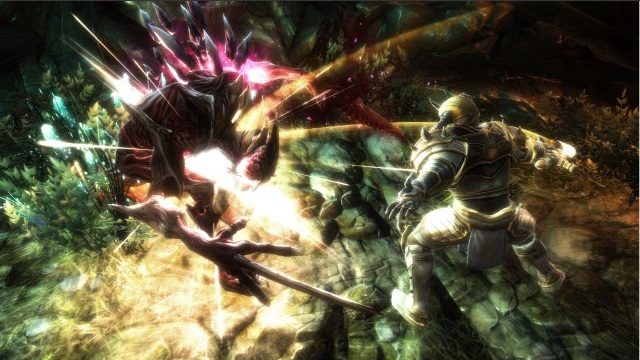Fate tempted, twisted, sealed.
Kingdoms of Amalur: Reckoning is a restless buffet of fantasy RPGs: a healthy serving of World of Warcraft's graphics, a scoop of Fable III's continuous world, a hearty slab of God of War's combat, a sprinkle of Dragon Age: Origins's loot system, a slice of skills from The Elder Scrolls: Oblivion, and bits and pieces from every other title in the genre. By the time you finish surveying the game's tutorial dungeon, you'll be crammed with a magnificent mishmash of ideas. Reckoning, like most buffets, aims to surprise you with its sheer size of options rather than its sophistication, and though it may not be as original as you might expect from an “original IP”, you will most certainly be full.
Reckoning persistently flirts with the generic, though it usually knows better not to follow through completely. It is, in few words, the well-done cliché—and nothing shows this more than the plot of the story: Hero has amnesia, finds out he/she has a special power, travels through the world using said power and cleansing it of bad guys (in this case, the Tuatha), and saves the world from the tragic war.
Luckily, N.Y. Times bestselling fantasy author R. A. Salvatore had more than just a passing interest as the writer for Kingdoms of Amalur, as he created its entire living, breathing universe. Though the majority of the dialogue is optional, it delves into the details of even the most minute sidequest with respectful attention to the written word. Common fantasy tropes instantly transform into enjoyable literature at the rhythmic construction of each sentence. Still, it's not until the faction sidequest for The House of Sorrows that the story truly moves away from standard fantasy themes. The even-handed Winter Fae and how they represent decay and death, two nouns commonly associated with evil, are one of the most interesting subraces I've seen in any video game.
Beyond these several brilliant moments, though, nearly every quest lacks significance apart from earning a handful of experience points and maybe a few coins. No matter how the writers dress up a side mission with interesting conversation, it's still a fetch quest. This might be acceptable in an MMORPG, but not in a single-player game that boasts 200 hours of content. It's troubling how much content inflation there is nowadays in fantasy RPGs, with worlds full of NPCs whose only purpose are to give out boring tasks, hand over a material reward, and then be discarded soon after.
Somewhere, the developers needed to concentrate on how quests connect together and on bolstering the player's influence upon the game world. Even after maxing out the persuasion skill, the choices you're given usually lead down the same path. This linearity would have been easier to swallow if there was at least an impactful consequence. There is a point in the main story that asks you to form allies for an upcoming battle, which would have been a reason to complete faction quests where perhaps the Fae, Warsworn, Travelers, and Scholia Arcana might offer a hand. Unfortunately, it's a missed opportunity, which only speaks to the general detachment of the core story from the abundant side quests of its world.
It also doesn't help that the voice work is not in sync with the character's mouths nor with the subtitles. This is a smudge that could be fixed with future patches but should have been ironed out through quality assurance.

Thankfully, smart combat and ample exploration propel the gameplay forward. Emphasizing a hybrid of strategies, fighting capably isn't confined to any particular skill tree, be it Might, Finesse, or Sorcery. Putting points into any skill tree is legitimate, as each of them have abilities for specific weapon expertise for both damage and new moves. Since the game rewards every build with a corresponding Destiny, which bestows additional power, and allows you to respec your character entirely with Fateweavers, there is no wrong way to develop your hero. You can even invest in all three skill trees if you want.
The third-person combat has comparable depth to the first God of War. In addition to a basic string of normal swipes and the ability to carry two weapons at a time, your hero can learn additional maneuvers out of a block, a dodge roll, and a parry, which will stagger an enemy if you block a melee attack at the precise time. Anyone who chooses the hard difficulty will quickly learn to switch between melee and ranged attacks, note which moves can be block-cancelled or used as juggles, exploit any weaknesses to elemental damage, and know when to use Reckoning mode where you enter a temporary state that slows time, enhances damage, and multiplies experience.
The only flaws in the combat are the slightly underwhelming variety of enemy types and the lackluster ending battle. Not only is the big baddie reveal rather unimaginative, but it's less about fighting the boss and more about fighting yourself. Let's just say the ending is lucky that there's a post-game.
It's more than understandable if you think the graphics look too deritative of some World of Warcraft landscape, though the atttention to color, hue, and luminescence is impressive. No environment is left untouched, and merely running through the flora and fauna of the forest in any direction, shooting arrows at overconfident bandits, and picking embereye plants for alchemic reagents can be a sight to behold—surprisingly lush and oddly soothing.

Unfortunately, the camera gets in the way of the scenery, getting caught on a hill slant or behind a solid object like a tree that obscures the view. The latter happens on occasion during dialogue sequences, where the screen becomes a huge chunk of wall or a close-up of a throne.
The skill system, obviously adapted from The Elder Scrolls, thoroughly complements the rest of the gameplay, whether it's sneaking and looting with the Stealth skill or any of the crafting skills. Some would say it's watered-down from the original source, but its intentional simplicity makes it more approachable and understandable. Crafting gems, weapons, and potions becomes a natural part of the journey along with obtaining and selling loot. Best of all, maxing out the Detect Hidden skill reveals all traps, treasures, and Fae lodestones, so that you don't need to purchase a guide (though perhaps take a gander at my free one!).
Kingdoms of Amalur: Reckoning is a taste of what happens when a developer decides to contend with nearly every good fantasy RPG idea. It's an astoundingly extensive—and foolhardy—task for an original IP, whose largest mistake is not that it's unpolished in spots, but that it, of little fault of its own, comes only a few months after The Elder Scrolls: Skyrim. Knowing this well ahead of time likely propelled 38 Studio and Big Huge Games toward a cel-shaded, casual, jack-of-all-trades design, but all things considered, Reckoning carries enough momentum to sustain its lengthy journey and sweeping world. It will not change the way you think about fantasy RPGs, but it certainly fits right in.
-
Well-written dialogue by R.A. Salvatore
-
The House of Sorrows
-
Cliched plot, side quests lack significance
-
Strong voice-work
-
...but with heavy synch issues
-
Strong hybrid of combat and exploration
-
Lush, vivid environments
-
60+ hours of content
-
Complementary skill system
-
Could have a much stronger ending
-
Camera isues









